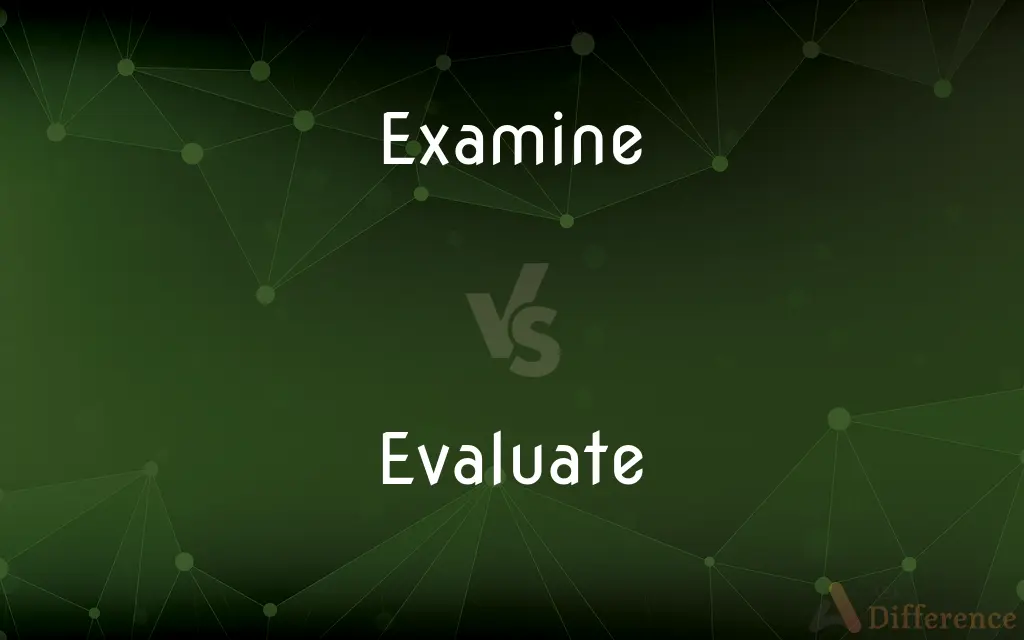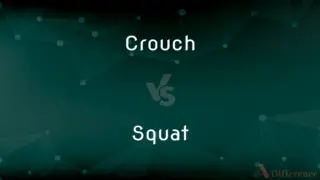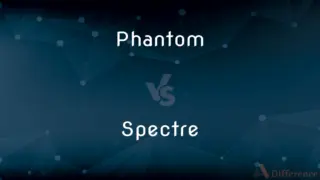Examine vs. Evaluate — What's the Difference?
Edited by Tayyaba Rehman — By Urooj Arif — Updated on March 29, 2024
Examine involves detailed inspection or analysis, while evaluate focuses on assessing value, significance, or quality.

Difference Between Examine and Evaluate
Table of Contents
ADVERTISEMENT
Key Differences
Examine refers to the process of inspecting or analyzing something in detail to understand its nature, structure, or condition. This process can involve looking at each part closely, often to gather information or diagnose. Evaluate, however, goes beyond examination to assess or judge the value, significance, quality, or importance of something. Evaluation involves making a judgment based on criteria or standards after examination.
While examining is about understanding what is present and identifying the components or aspects of the subject under scrutiny, evaluating is about making a judgment on those findings. For example, a doctor examines a patient to understand their health status, and based on the examination, the doctor evaluates the patient's condition to decide on a treatment plan.
In the context of education, examining might involve testing a student's knowledge or understanding of a subject, whereas evaluating would be grading the student's performance based on the examination results. Thus, evaluation often requires a set of standards or criteria against which the subject is judged.
The tools and methods used in examination and evaluation can overlap, but their purposes distinguish them. Examination aims to discover facts or details, while evaluation aims to provide a judgment or value based on those facts.
In practical application, examination is a prerequisite for evaluation. One must first examine or analyze the subject thoroughly before it can be evaluated effectively. This sequential relationship underscores the foundational role of examination in the evaluative process.
ADVERTISEMENT
Comparison Chart
Purpose
To inspect or analyze in detail
To assess value, significance, or quality
Focus
Understanding presence, condition, or structure
Making a judgment based on findings
Method
Close inspection, analysis
Judgment based on criteria or standards
Application
Gathering information, diagnosing
Deciding on importance, making decisions
Sequence
Often precedes evaluation
Follows examination, based on its findings
Compare with Definitions
Examine
To inspect closely or in detail.
Scientists examine samples under a microscope to study their structure.
Evaluate
To assess against a set of standards or criteria.
Teachers evaluate student essays based on criteria like clarity, argument, and grammar.
Examine
To test or assess knowledge or skills.
The instructor examined the students through a series of quizzes.
Evaluate
To consider or reflect on the significance of something.
Evaluate the risks before making a financial investment.
Examine
Aimed at understanding or discovering.
Historians examine ancient texts to learn about past civilizations.
Evaluate
To judge or determine the value, quality, or importance.
After examining the data, the researcher evaluated the effectiveness of the treatment.
Examine
To investigate or analyze.
The committee will examine the proposal before making a recommendation.
Evaluate
Involves making a decision based on analysis.
The jury evaluates the evidence to reach a verdict.
Examine
Involves looking for details or evidence.
Detectives examine the crime scene for clues.
Evaluate
Aimed at making a judgment.
Critics evaluate movies based on storytelling, acting, and direction.
Examine
To observe carefully or critically; inspect
Examined the room for clues.
Evaluate
Form an idea of the amount, number, or value of; assess
The study will assist in evaluating the impact of recent changes
A system for evaluating how well the firm is performing
Examine
To study or analyze
Examine a tissue sample under a microscope.
Examine the structure of a novel.
Examine one's own motives.
Evaluate
Find a numerical expression or equivalent for (an equation, formula, or function)
Substitute numbers in a simple formula and evaluate the answer
Examine
To test or check the condition or health of
Examine a patient.
Evaluate
To ascertain or fix the value or amount of
Evaluate the damage from the flood.
Examine
To determine the qualifications, aptitude, or skills of by means of questions or exercises
Students are examined with standardized tests.
Evaluate
To determine the importance, effectiveness, or worth of; assess
Evaluate teacher performance.
Examine
To question formally, as to elicit facts or information; interrogate
Examine a witness under oath.
Evaluate
(Mathematics) To calculate the numerical value of; express numerically.
Examine
To observe or inspect carefully or critically
He examined the crime scene for clues.
She examined the hair sample under a microscope.
Evaluate
(transitive) To draw conclusions from examining; to assess.
It will take several years to evaluate the material gathered in the survey.
Examine
To check the health or condition of something or someone
The doctor examined the patient.
Evaluate
To compute or determine the value of (an expression).
Evaluate this integral.
Examine
To determine the aptitude, skills or qualifications of someone by subjecting them to an examination
Evaluate
To return or have a specific value.
Examine
To interrogate
The witness was examined under oath.
Evaluate
To fix the value of; to rate; to appraise.
Examine
To test by any appropriate method; to inspect carefully with a view to discover the real character or state of; to subject to inquiry or inspection of particulars for the purpose of obtaining a fuller insight into the subject of examination, as a material substance, a fact, a reason, a cause, the truth of a statement; to inquire or search into; to explore; as, to examine a mineral; to examine a ship to know whether she is seaworthy; to examine a proposition, theory, or question.
Examine well your own thoughts.
Examine their counsels and their cares.
Evaluate
Place a value on; judge the worth of something;
I will have the family jewels appraised by a professional
Examine
To interrogate as in a judicial proceeding; to try or test by question; as, to examine a witness in order to elicit testimony, a student to test his qualifications, a bankrupt touching the state of his property, etc.
The offenders that are to be examined.
Examine
Consider in detail and subject to an analysis in order to discover essential features or meaning;
Analyze a sonnet by Shakespeare
Analyze the evidence in a criminal trial
Analyze your real motives
Examine
Observe, check out, and look over carefully or inspect;
The customs agent examined the baggage
I must see your passport before you can enter the country
Examine
Question or examine thoroughly and closely
Examine
Question closely
Examine
Put to the test, as for its quality, or give experimental use to;
This approach has been tried with good results
Test this recipe
Common Curiosities
Why is it important to distinguish between examining and evaluating in education?
Distinguishing between the two helps in understanding the process of learning and assessment, where examining is related to exploring knowledge, and evaluating is related to grading or judging the understanding of that knowledge.
Can you examine without evaluating?
Yes, you can examine something closely without making a judgment about its value or quality, focusing solely on understanding its nature.
What is the primary difference between examining and evaluating?
The primary difference is that examining is about detailed inspection or analysis, while evaluating involves assessing the value, quality, or significance based on that examination.
Is evaluating possible without examining first?
Effective evaluation typically requires prior examination to gather the necessary information for making an informed judgment.
How do examine and evaluate relate in the scientific method?
In the scientific method, examining involves observing and gathering data, while evaluating involves analyzing that data to draw conclusions or verify hypotheses.
How do examine and evaluate work together in problem-solving?
In problem-solving, examining helps identify the details of the problem, and evaluating helps in choosing the best solution based on the examination.
Are examine and evaluate interchangeable in any context?
Although closely related, they are not interchangeable because they serve different purposes in the process of inquiry and judgment.
Can the outcome of an evaluation affect subsequent examinations?
Yes, the outcomes of evaluations can inform and guide further examinations, especially when identifying areas for improvement or further investigation.
Can the same methods be used for both examining and evaluating?
While some methods overlap, the intent behind them differs; examination methods aim to uncover facts, whereas evaluation methods aim to judge those facts.
How does one transition from examining to evaluating?
The transition involves moving from a detailed understanding or analysis of the subject to making judgments about it based on established criteria or standards.
Share Your Discovery

Previous Comparison
Crouch vs. Squat
Next Comparison
Phantom vs. SpectreAuthor Spotlight
Written by
Urooj ArifUrooj is a skilled content writer at Ask Difference, known for her exceptional ability to simplify complex topics into engaging and informative content. With a passion for research and a flair for clear, concise writing, she consistently delivers articles that resonate with our diverse audience.
Edited by
Tayyaba RehmanTayyaba Rehman is a distinguished writer, currently serving as a primary contributor to askdifference.com. As a researcher in semantics and etymology, Tayyaba's passion for the complexity of languages and their distinctions has found a perfect home on the platform. Tayyaba delves into the intricacies of language, distinguishing between commonly confused words and phrases, thereby providing clarity for readers worldwide.













































